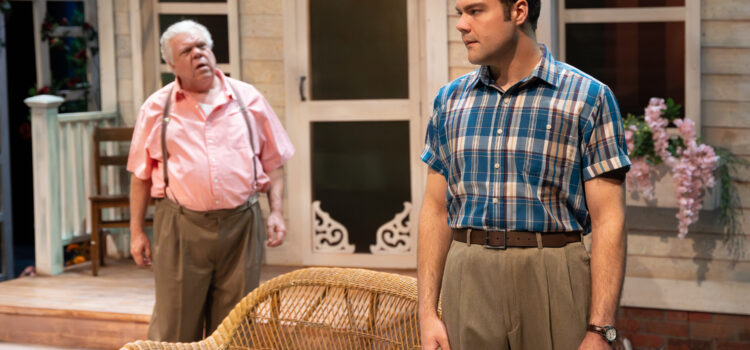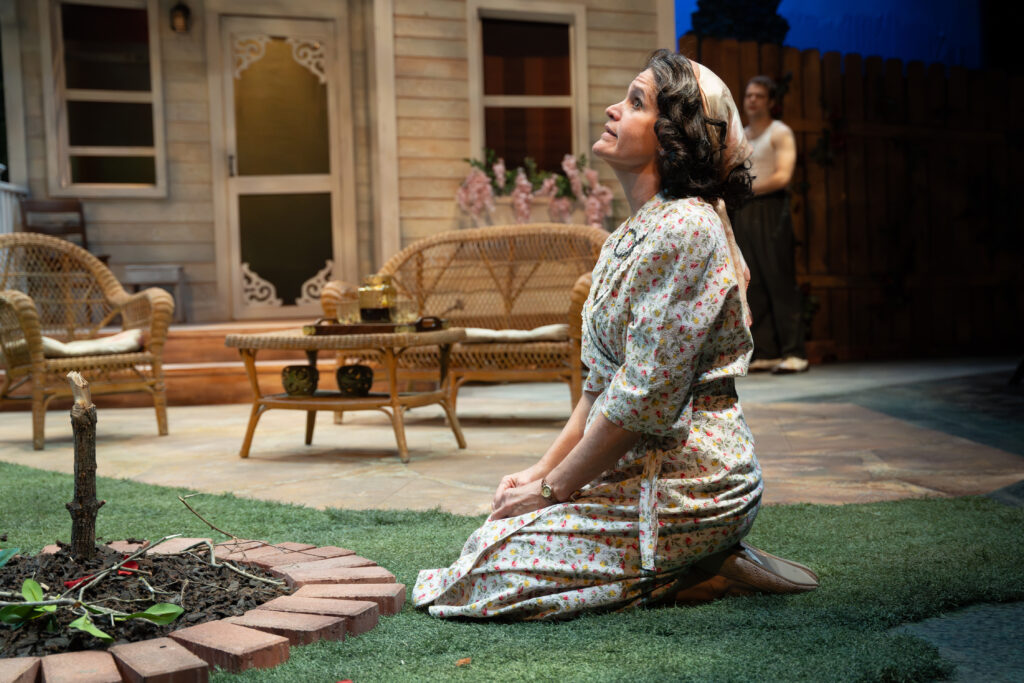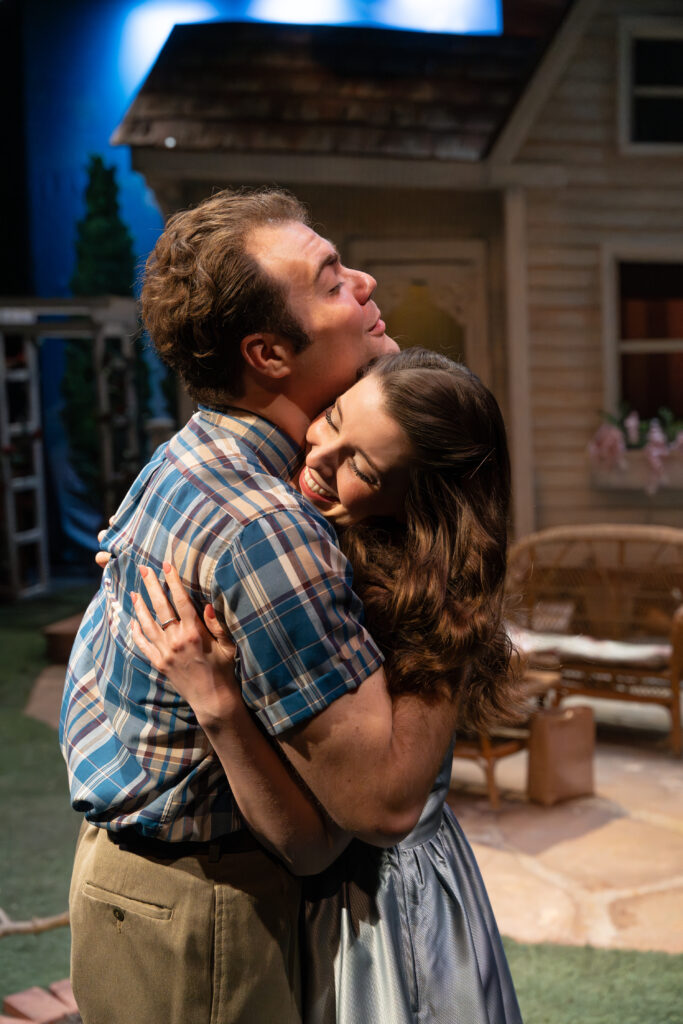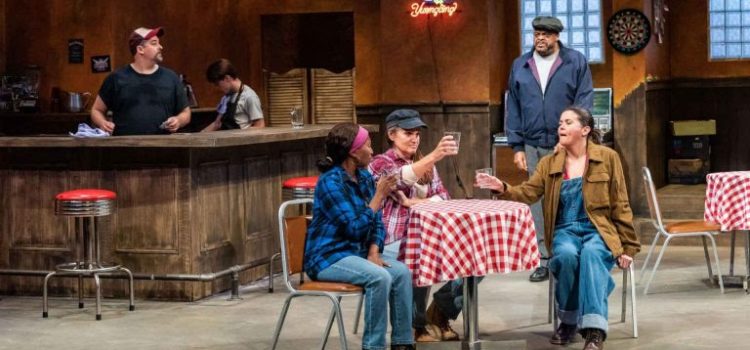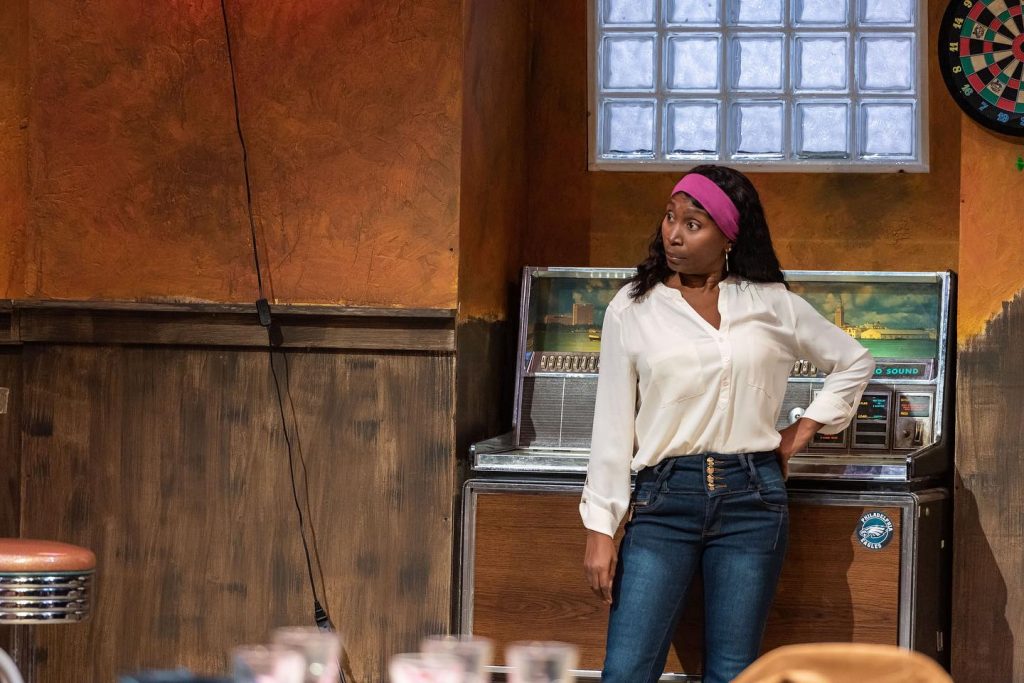By Lynn Venhaus
With its Dream Team of actresses eliciting all the feels, a sterling “Steel Magnolias” is a warm and wry reminder about the connective tissue that binds us – whether it’s family, friends or community ties.
In only the second play produced by Stages St. Louis, following the runaway success of last year’s “Clue” (winner of five St Louis Theater Circle Awards out of 11 nominations), the company has kicked off its 38th season with an enduring classic.
Robert Harling’s beloved comedy-drama honored his late sister, Susan-Harling Robinson, who died of complications from Type 1 diabetes in 1985. Taking place over three years, the play celebrates the special bond of a group of women in a small Southern town.
First presented off-Broadway in March 1987, the play opened on Broadway that June, and ran for 1,126 performances until it closed in 1990. The original 1989 smash hit film starred an all-aces ensemble including Sally Field, Shirley MacLaine, Olympia Dukakis, Dolly Parton, Darryl Hannah and Julia Roberts in her first Oscar-nominated role.
Those are some heavy shoes to fill, but with this irresistible group, it’s a pleasure to watch them interact like they’re an Olympic sports team at play. Their fervor for this work is obvious, and they each bring something fresh to their roles.

In her Stages St. Louis debut, intuitive Amy Loui anchors the cast as doting but worry-wart mother M’Lynn as they get ready for daughter Shelby’s wedding. Taylor Quick is also making her Stages debut as the vivacious Shelby, sparkling with personality.
The women gather at Truvy’s Beauty Spot, an in-home salon. Spunky Jilanne Marie Klaus scampers around as the busy business owner, dispensing homespun wisdom with a side of sass zhuzhing their hair.
Playing off each other like one would expect the grand dames of St. Louis theater to achieve with their snappy banter and impeccable timing, Kari Ely is the elegant and affluent widow Clairee who loves to gossip and Zoe Vonder Haar is the crotchety and very wealthy Ouiser who loves to annoy.
Sparks fly as the two trade barbs and speak their minds. Ely is marking 30 seasons with this company and Vonder Haar has been in 75 shows there.
Ouiser is such a crowd favorite that the audience erupted into applause when Zoe made her blustery entrance. She brought the house down uttering the famous line: “I’m not crazy, I’ve just been in a bad mood for 40 years.”
The character with the most growth is Annelle, hired as Truvy’s assistant. As played by Abigail Isom, she’s timid, but a people-pleaser, with enough problems to fill the lyrics of a country song. After dipping back into the dating pool, she becomes a Bible-thumper, which perplexes some of the ladies.
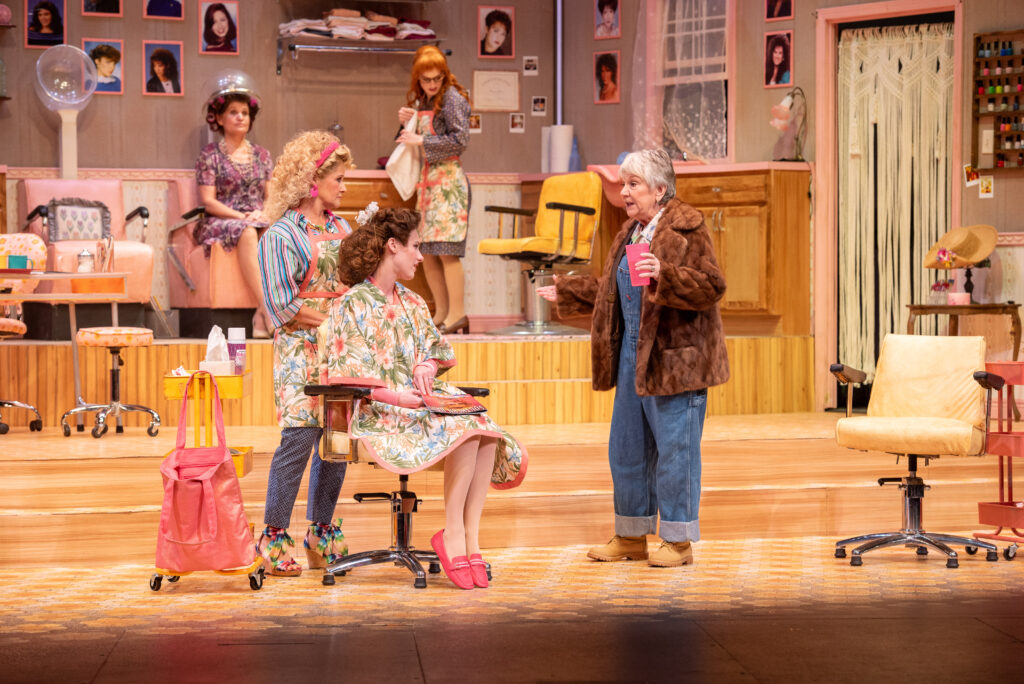
Harling grew up in Natchitoches but set the play in the fictional northwest Louisiana parish of Chinquapin. He’s filled the conversations with colloquial references, mentioning the local football games, festivals, beauty pageants, and special occasions that give a place its color.
Those distinctive cadences make the show appealing, smoothly delivered and tugging at our emotions.
While the women cope with life’s rhythms, Shelby’s health deteriorates after a risky pregnancy doctors warned her about, and that stubborn streak puts her at odds with her concerned mother.
In real life, Harling’s sister gave birth to his namesake nephew and when a kidney transplant failed, it led to her body wearing out.
Director Paige Price’s care in honoring these delightful women is notable. She smartly moves the show along in a well-appointed space, with an outstanding scenic design from Kate Rance. They’ve both captured an authentic glimpse of Southern living in the ‘80s.
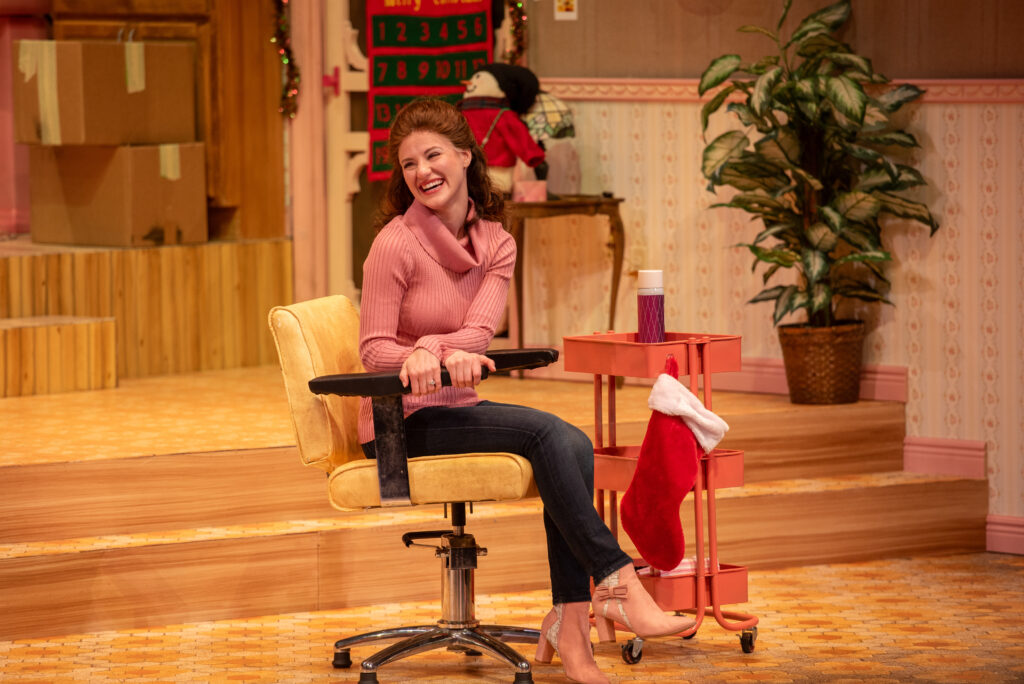
Shelby’s signature color pink is highlighted in not only her fetching wardrobe but inside the inviting beauty shop too.
Costume designer Brad Musgrove has created an attractive array of looks befitting the characters’ ages and economic status. He selected a pleasing color palette to make the characters come alive.
A big component to the characters’ looks is the wig and hair designs by Daniel Paller, and he managed to create remarkably realistic hairstyles for each character.
Dialect coach Pam Reckamp’s work is especially noteworthy, considering all six’s Southern drawls are maintained without dropping throughout the two acts.
Lighting designer Sean M. Savoie’s customary excellence is on display, after 10 years of memorable work at Stages. The crisp sound design by two-time Tony winner Nevin Steinberg includes a mix of Shelby’s favorite songs playing on the radio. The local DJ is voiced with authority by unseen Kurt Deutsch.
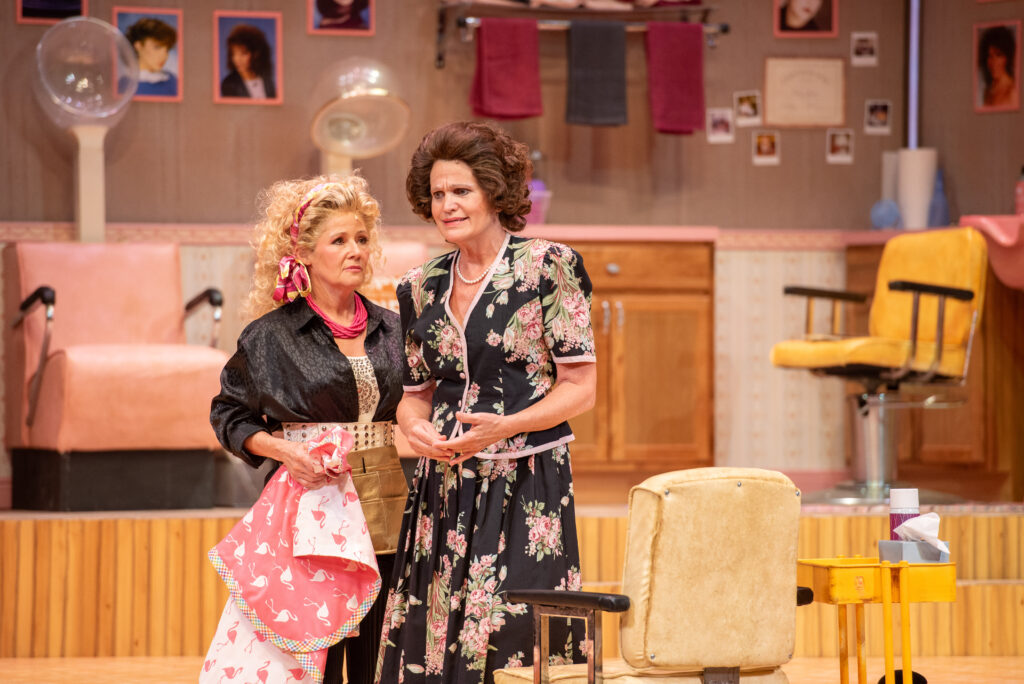
There isn’t a false note conveying his family’s personal tragedy as Harling adroitly combined heartache with humor. The one-liners zing and the tears are earned.
Because of its believability, “Steel Magnolias” holds a special place in people’s hearts. Anyone undergoing grief and loss can relate. And the women’s strength is to be admired, even when they’re tossing off quips.
Sentimental without being sappy and sincere without being maudlin, “Steel Magnolias” demonstrates the enriching aspect of female friendships. And we’re the lucky ones to be reminded how very special the people in our orbit can be.
This production is a chef’s kiss. And don’t forget your tissues.
Stages St. Louis presents “Steel Magnolias” May 31 through June 30 at the Kirkwood Performing Arts Center in Kirkwood. For more information, visit www.stagesstlouis.org.


Lynn (Zipfel) Venhaus has had a continuous byline in St. Louis metro region publications since 1978. She writes features and news for Belleville News-Democrat and contributes to St. Louis magazine and other publications.
She is a Rotten Tomatoes-approved film critic, currently reviews films for Webster-Kirkwood Times and KTRS Radio, covers entertainment for PopLifeSTL.com and co-hosts podcast PopLifeSTL.com…Presents.
She is a member of Critics Choice Association, where she serves on the women’s and marketing committees; Alliance of Women Film Journalists; and on the board of the St. Louis Film Critics Association. She is a founding and board member of the St. Louis Theater Circle.
She is retired from teaching journalism/media as an adjunct college instructor.




